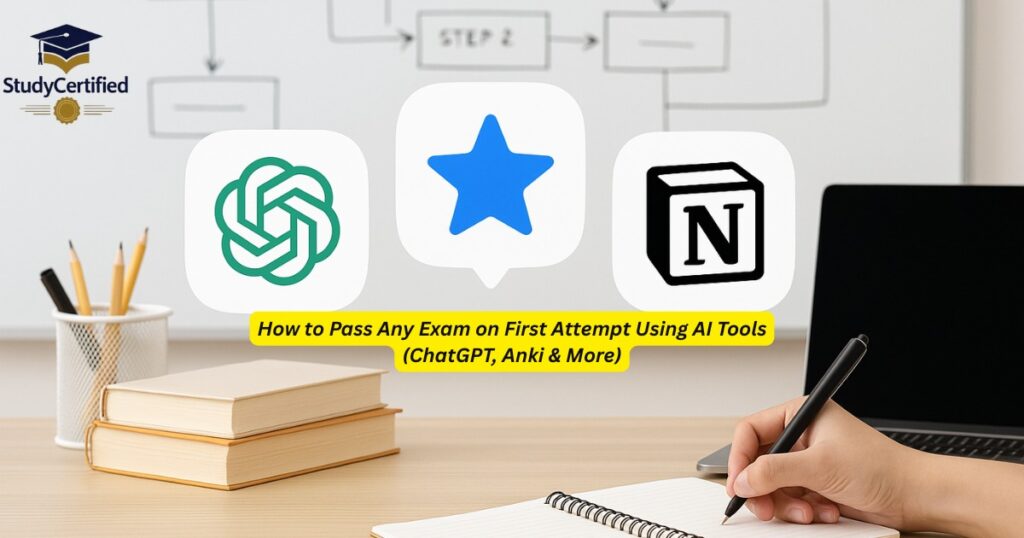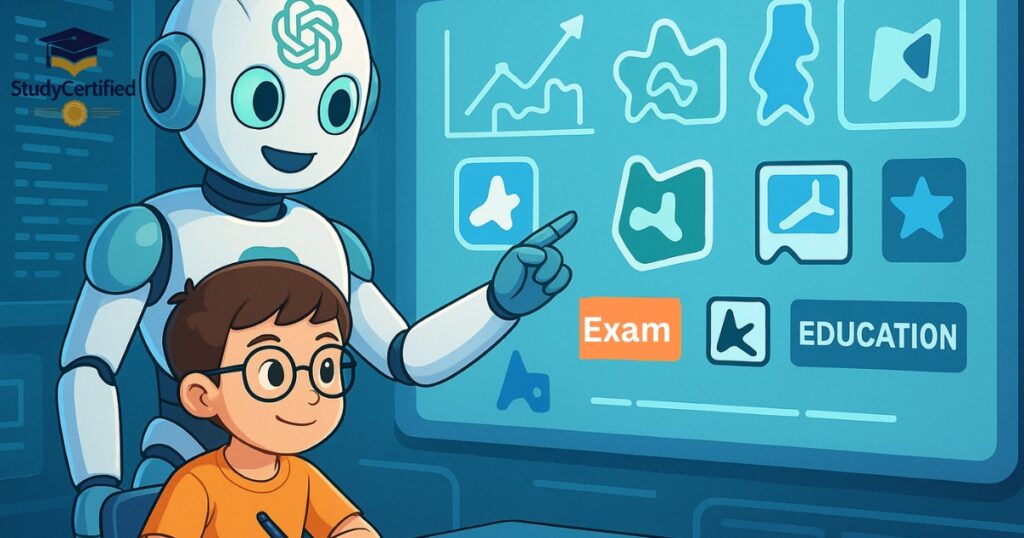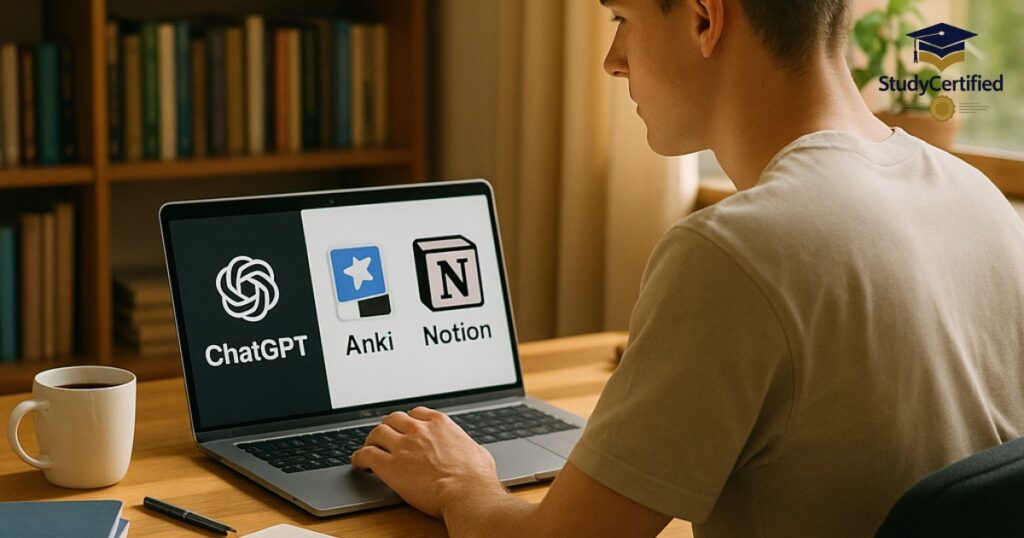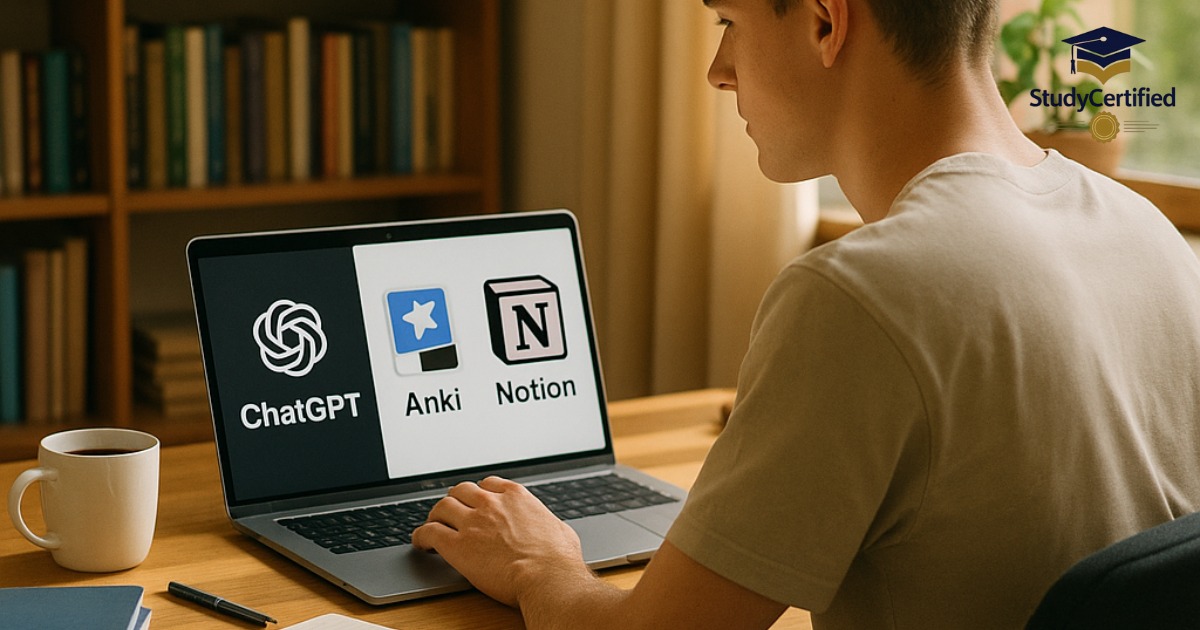Introduction: Smarter Learning Starts with AI
Struggling with outdated study methods, information overload, or exam stress? You’re not alone. Today, students around the world are discovering better ways to prepare, thanks to AI.
Yes, passing your exams on the first attempt is now possible. In this guide, “How to Pass Any Exam on the First Attempt Using AI Tools,” you’ll learn how to replace cramming and burnout with focused, personalized learning using tools like ChatGPT, Anki, Notion AI, and PrepAI.
Whether you’re studying for the SAT, IELTS, GRE, UPSC, or any professional exam, AI can help you:
- Build personalized study plans based on your strengths and weaknesses
- Practice with realistic mock tests and receive instant feedback
- Improve your writing, vocabulary, and language skills
- Stay focused and manage your time with AI-powered planners
Get ready to study with confidence, retain more, and pass your exams—smarter and faster.
1. Personalized Learning and Smart Study Plans
Tailored Learning Plans
Adaptive learning platforms evaluate your strengths and weaknesses to build a personalized study path—no more one-size-fits-all. Tools like Mindgrasp help you study smarter by generating topic-based summaries, notes, and quizzes based on your needs and performance.
Example: Struggling with biology? Mindgrasp can highlight only the weak areas, summarize them, and give you a short quiz to reinforce learning.
AI Tutors for Instant Concept Clarity
Need quick help with a tough subject? Platforms like ChatGPT and TutorOcean act as AI tutors for students, simplifying complex topics—whether it’s a physics formula or a confusing historical event. You get clear, easy-to-understand explanations anytime you need them.
Example: Ask ChatGPT to explain Newton’s Laws in simple terms, or get a breakdown of World War II causes in bullet points.
Boost Memory with Spaced Repetition
Using Anki’s spaced repetition method, you review information at optimal intervals—just before you’re likely to forget it. This scientifically backed system is ideal for subjects that require heavy memorization, like medicine, law, or foreign languages.
Example: Add legal definitions or medical terms to Anki flashcards and let the system schedule review sessions for long-term retention.
2. AI-Powered Practice Exams & Instant Feedback
Mock Test Simulations
Tools like PrepAI, Quizlet, and ExamAI create customized mock exams that mimic real test conditions. Practicing with these simulations helps you build confidence and get comfortable with the exam format.
Example: Take a timed mock test on PrepAI to simulate exam day pressure, then review your answers immediately to spot tricky questions.
Real-Time Feedback
AI instantly evaluates your answers, pointing out areas where you need improvement and offering suggestions to help you learn faster and smarter.

Performance Tracking
Platforms such as Anki and Notion AI provide detailed dashboards to monitor your progress daily, weekly, and by subject. This way, you always know where to focus your efforts for maximum results.
Example: Use Anki’s performance stats to identify which flashcards you frequently miss and prioritize reviewing them.
3. Boost Focus and Manage Time Efficiently
Use Focus Keeper and Pomodoro Tools
Apps like Focus Keeper apply the Pomodoro Technique, which breaks your study time into focused intervals (usually 25 minutes) followed by short breaks. This approach helps you maintain concentration, avoid burnout, and get more done without feeling overwhelmed.
Example: Try studying for 25 minutes, then take a 5-minute break to stretch or relax—repeat this cycle 4 times, then take a longer break.
Leverage AI Scheduling Assistants
AI-powered planners such as StudyGPT and Notion AI create personalized study schedules tailored to your goals, exam dates, and daily energy levels. These smart tools adjust your plan dynamically, helping you stay organized and make the most of your study time.
Example: Input your exam dates and available study hours, and let Notion AI build a plan that balances difficult topics with review sessions.
4. Improve Language Skills & Test-Taking Strategies
Practice Language Interactively
Grammarly and ChatGPT make practicing language skills easier and more engaging. Whether you need to improve your speaking, writing, or vocabulary, these tools offer exercises tailored for exams like IELTS, TOEFL, and GRE. You can have real-time conversations, get instant grammar corrections, and expand your vocabulary—all at your own pace.
Example: Try asking ChatGPT to help you write a short essay or practice answering speaking questions to build confidence.
Learn Smart Exam Techniques
Beyond language practice, AI can help you master test-taking strategies that make a big difference on exam day. For example, it can teach you how to:
- Eliminate wrong answer choices quickly to boost your chances of picking the right one
- Manage reading comprehension effectively, so you don’t get stuck on long passages
- Prioritize sections that carry the most points, helping you focus your energy where it counts
- Allocate your time wisely across different question types to avoid running out of time
Example: Use AI to simulate timed reading passages, then practice skimming for key points rather than reading every word.
Combining better language skills with smart strategies means you’ll not only understand the material better but also tackle the exam with confidence and efficiency.
5. Best AI Tools for Exam Preparation (2025 Edition)
| Tool | Best For |
| ChatGPT | Instant Q&A, mock tests, explanations |
| Anki | Long-term retention, spaced repetition |
| Notion AI | Study schedules, performance dashboards |
| Quizlet | Flashcards, quizzes, and class collaboration |
| Mindgrasp | Summarizing textbooks and lectures |
| Otter.ai | Converting lectures to editable notes |
| PrepAI | Exam simulation and test creation |

Success Stories: Real Students, Real Results
Sarah Khan, Medical Student (Pakistan)
“I passed my medical entrance exam with ChatGPT’s help. It was like having a tutor who explained things anytime I got stuck — no more waiting for help!”
Liam Johnson, Graduate Student (USA)
“PrepAI’s AI mock tests helped me get comfortable with exam timing and reduced my anxiety. It felt just like the real thing.”
Sophia Martinez, High School Senior (Spain)
“Focus Keeper’s Pomodoro timers kept me focused during long study sessions. It helped me avoid burnout and stay productive.”
Arjun Patel, Engineering Student (India)
“Anki flashcards were a game changer for memorizing formulas and concepts. Reviewing daily made all the difference.”
Amina Yusuf, University Graduate (Kenya)
“Mindgrasp helped me quickly summarize complex textbooks. It saved me hours and made revision much easier.”
Final Tips: Make AI Work For You
AI tools can effectively make a huge difference in how you prepare for exams. Here’s a detailed strategy to help you study smarter, not harder:
- Start Each Session by Reviewing Your Anki Flashcards
Anki is a powerful spaced repetition tool that helps you remember information long-term. Begin your study time by going through your flashcards to reinforce what you’ve already learned. This keeps important facts fresh in your mind and builds a solid foundation before moving on to new material. - Ask ChatGPT 3 to 5 Questions Per Topic
ChatGPT is like having a tutor available 24/7. For each topic, try asking 3 to 5 specific questions. This helps you identify gaps in your understanding and get clear, easy-to-understand explanations. You can also ask for examples or quiz questions to test yourself. - Use PrepAI for Weekly Mock Exams
Taking practice exams is crucial for exam success. PrepAI offers mock tests tailored to your subject, helping you get familiar with the exam format and timing. Regular mock exams give you instant feedback, so you know where to focus your efforts next. - Organize Your Study Plan in Notion AI
A well-structured plan keeps you on track and reduces stress. Use Notion AI to create your personalized study schedule, track your progress, and store notes and resources all in one place. This way, you won’t waste time searching for materials or wondering what to study next. - Track Your Focus with Focus Keeper
Staying focused during study sessions can be tough. Focus Keeper uses the Pomodoro technique—working in short, intense bursts with breaks—to improve concentration and prevent burnout. Use it to manage your study time effectively and keep your mind fresh. - Reflect Weekly and Adapt Your Strategy
Set aside time at the end of each week to review what you’ve accomplished and how you’re feeling about your progress. Did some methods work better than others? Are there topics you still struggle with? Adjust your plan accordingly to keep improving and stay motivated. - Remember: Success isn’t just about studying harder—it’s about studying smarter. Combining consistent effort with these AI-powered tools will give you a clear advantage and help you pass your exams on the first try.

Conclusion: Pass Smarter, Not Harder
AI is changing the way we learn and study. If you’re wondering how to pass any exam on the first attempt using AI tools (ChatGPT, Anki & more), the answer lies in using these smart apps to make studying easier. They help you remember better, get quick feedback, and tailor learning to what you need most.
Give AI a try in your study routine and see how it can help you pass your exams the smart way without all the extra stress.
Ready to boost your study game? Start exploring these AI tools today and take the first step toward exam success!

I am an Assistant Professor at UCSC with a background as a Postdoctoral Scholar in Environmental Policy, Science, and Management at UC Berkeley. My research centers on soil biophysiochemical processes and nitrogen cycling, aimed at mitigating agriculture’s environmental footprint. I hold a PhD and MS in Soils and Biogeochemistry from UC Davis, where I received the DOE Office of Science Graduate Student Research award. My work combines field investigations, laboratory experiments, and modeling. Additionally, I have provided international consulting on soil remediation. I earned a BA in Mathematics from Bryn Mawr College and previously contributed to the University of Delaware’s Environmental Soil Management Group.

